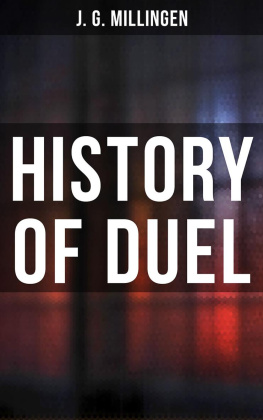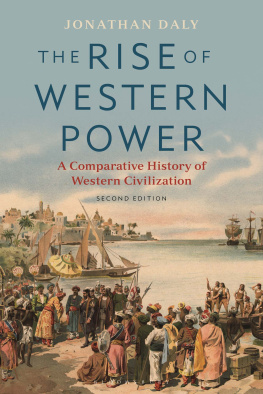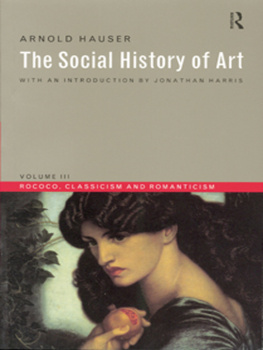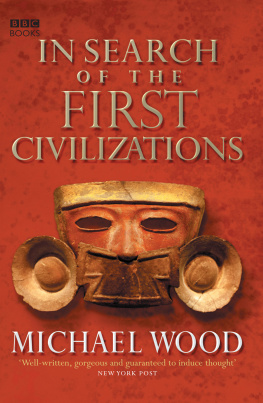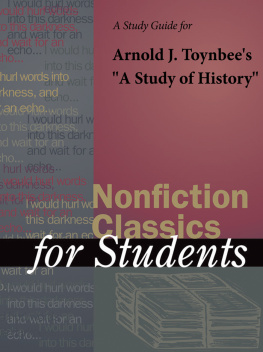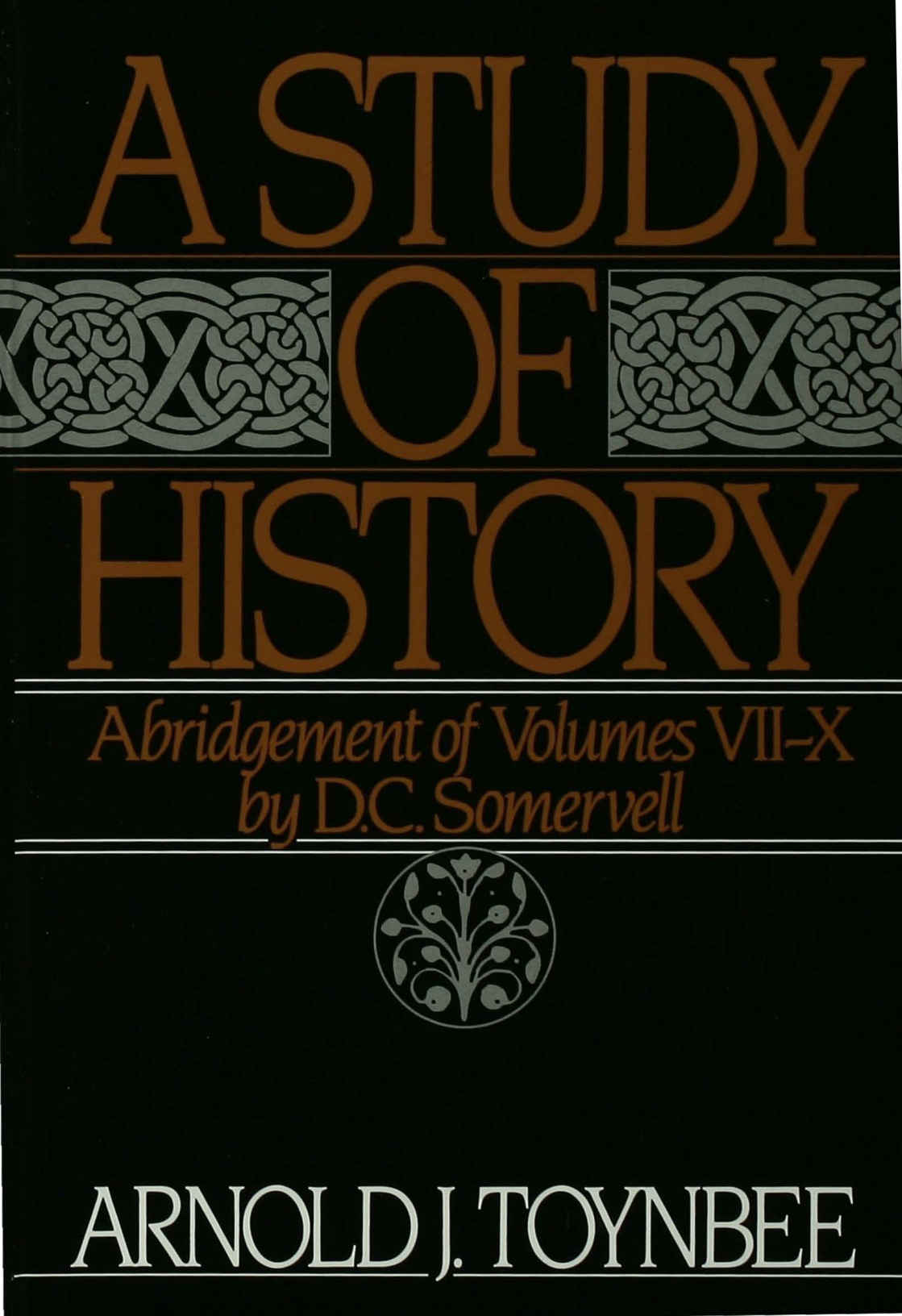
A STUDY OF HISTORY
The Royal Institute of International Affairs is an unofficial and non-political body, founded in 1920 to encourage and facilitate the scientific study of international questions .
The Institute, as such, is precluded by its rules from expressing an opinion on any aspect of international affairs; opinions expressed in this book are, therefore, purely individual .
A STUDY OF HISTORY
BY
ARNOLD J. TOYNBEE
Doloris
Sopitam recreant volnera viva animam.
Anon .
ABRIDGEMENT
OF VOLUMES VII-X
BY
D. C. SOMERVELL

Oxford University Press
Oxford New York Toronto
Delhi Bombay Calcutta Madras Karachi
Petaling Jaya Singapore Hong Kong Tokyo
Nairobi Dar es Salaam Cape Town
Melbourne Auckland
and associated companies in
Beirut Berlin lbadan Nicosia
1957 by Oxford University Press, Inc.;
renewed 1985 by Robert Somervell, Mary Brautaset, and Lawrence Toynbee
First published in 1957 in Great Britain by Oxford University Press, Walton Street, Oxford OX2 6DP, and in the United States by Oxford University Press, Inc., 198 Madison Avenue, New York, New York 100164314
First issued as an Oxford University Press paperback, 1987
Oxford is a registered trademark of Oxford University Press
All rights reserved. No part of this publication may be reproduced, stored in a retrieval system, or transmitted, in any form or by any means, electronic, mechanical, photocopying, recording, or otherwise, without the prior permission of Oxford University Press, Inc.
Library of Congress Cataloging-in-Publication Data
Toynbee, Arnold Joseph, 18891975.
A study of history.
Includes indexes.
1. Civilization. 2. HistoryPhilosophy. I. Somervell,
D. C. (David Churchill), 18851965. II. Title.
CB63.T6433 1987 909 87-12291
ISBN 13 978-0-19-500198-3 (v. I)
ISBN 0-19-500198-2 (v. I)
ISBN 13 978-0-19-505080-6(pbk.: v. I)
ISBN 0-19-505080-0 (pbk.: v. 1)
ISBN 13 978-0-19-500199-0 (v. 2)
ISBN 0-19-500199-0 (v. 2)
ISBN 13 978-0-19-505081-3 (pbk.: v. 2)
ISBN 0-19-505081-9 (pbk.: v. 2)
20 19 18 17 16 15 14
Printed in the United States of America
PREFACE
IAM fortunate in having twice had Mr. Somervell for my partner. After having first abridged volumes i-vi of A Study of History , he has now done the same skilful work on volumes vii-x. So the reader now has at his command a uniform Abridgement of the whole book, made by a clear mind that has not only mastered the contents but has entered into the writers outlook and purpose.
In the production of this second instalment of the Abridgement, Mr. Somervell and I have worked together in the same way as before. In going through Mr. Somervells script before publication, I have rarely suggested putting in again anything that he has left out. A writer is usually not a good judge of what it is best to cut out of his own work, and Mr. Somervell has a wonderfully good eye for thisas will have been found by anyone who has compared the first instalment of his Abridgement with the original. This time, as before, I have practically confined myself to working over the passages that he has retained, and so making them my own as well as his. This has not been difficult, as he has managed, as before, to keep to my words to a large extent in reproducing the gist of my meaning. Where he has added points and illustrations of his own, as he has done here and there, I have been glad to see something that is his coalesce with what is mine.
For a long book like mine, in a busy age like this, it is a boon to be abbreviated in a first-rate Abridgement, such as Mr. Somervells is. This makes the book accessible to readers who might not have had the patience, or at any rate not the time, to read the original. To my mind, the original and the Abridgement are complementary. Some readers of the second instalment of the Abridgement may, I hope, be led on, as I know some readers of the first have been, to dip into the original, if not to read the whole of it; and some intrepid readers of the original may find the Abridgement, too, useful for recalling the general argument and structure of the book. In some ways, the deftest piece of Mr. Somervells work seems to me to be the concluding summary of his Abridgement of all ten volumes of the original.
Our co-operation over both instalments of the Abridgement has been a very happy experience for me.
1 December 1955 ARNOLD TOYNBEE
NOTE
BY THE MAKER OF THIS ABRIDGEMENT
THE fact that this volume starts with Part VI, chapter XXIII, is a reminder that this is not a complete work but the latter part of one, and a reader who entered upon it without any knowledge of what had gone before would find himself involved in much the same difficulties as would beset him if he began reading the third volume of one of the Victorian three-volume novels. At the end of this volume will be found an Argument, summarizing the course of the whole work. It may be useful to those who have read the earlier part of Mr. Toynbees Study , either in its original or its abridged form, and partly forgotten it.
I am very grateful to Miss O. P. Self for compiling the Index to this book:
1955 D. C. S.
CONTENTS
A STUDY OF HISTORY
VI
UNIVERSAL STATES
XXIII. ENDS OR MEANS?
THE starting-point of this book was a search for fields of historical study which would be intelligible in themselves within their own limits of space and time, without reference to extraneous historical events. The search for these self-contained units led us to find them in Societies of the species we called Civilizations, and so far we have been working on the assumption that a comparative study of the geneses, growths, breakdowns, and disintegrations of the twenty-one Civilizations that we have succeeded in identifying would comprehend everything of any significance in the history of Mankind since the time when the first Civilizations emerged from the Primitive Societies. Yet from time to time we have stumbled upon indications that this, our first, master-key might not serve to unlock all the doors through which we have to pass to reach our mental journeys end.
Near the outset, in the act of identifying as many Civilizations as were known to have existed, we found that certain of them were related to one another in a manner which we called apparentation-and-affiliation, and we found also that the evidences of this relationship were certain characteristic social products of a Dominant Minority, an Internal Proletariat, and an External Proletariat, into which the apparented Society split up in the course of its disintegration. It appeared that dominant minorities produced philosophies which sometimes gave inspirations to universal states, that internal proletariats produced higher religions which sought to embody themselves in universal churches, and that external proletariats produced heroic ages which were the tragedies of barbarian war-bands. In the aggregate these experiences and institutions manifestly constitute a link between an apparented and an affiliated Civilization.
Moreover, this link in the time-dimension between two non-contemporary Civilizations is not the only kind of relation between Civilizations that a comparative study of universal states, universal churches, and heroic ages brings to light. These fractions, into which Civilizations, after breakdown, disintegrate, acquire a liberty to enter into social and cultural combinations with alien elements derived from other contemporary Civilizations. Some universal states have been the handiwork of alien empire-builders; some higher religions have been animated by alien inspirations, and some barbarian war-bands have imbibed a tincture of alien culture.
Next page

